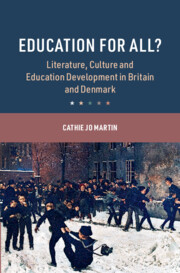
-
Select format
-
- Publisher:
- Cambridge University Press
- Publication date:
- 27 September 2023
- 21 September 2023
- ISBN:
- 9781009419673
- 9781009419659
- 9781009419666
- Creative Commons:
-
This content is Open Access and distributed under the terms of the Creative Commons Attribution licence CC-BY-ND 4.0.
https://creativecommons.org/creativelicenses - Dimensions:
- (229 x 152 mm)
- Weight & Pages:
- 0.59kg, 290 Pages
- Dimensions:
- (229 x 152 mm)
- Weight & Pages:
- 0.444kg, 290 Pages
- Subjects:
- Education policy, strategy and reform, Education, Politics and International Relations, Education, History, Theory, Comparative Politics
Open AccessYou have digital access to this book- Subjects:
- Education policy, strategy and reform, Education, Politics and International Relations, Education, History, Theory, Comparative Politics
Book description
Why did Denmark develop mass education for all in 1814, while Britain created a public-school system only in 1870 that primarily educated academic achievers? Cathie Jo Martin argues that fiction writers and their literary narratives inspired education campaigns throughout the nineteenth-century. Danish writers imagined mass schools as the foundation for a great society and economic growth. Their depictions fortified the mandate to educate all people and showed neglecting low-skill youth would waste societal resources and threaten the social fabric. Conversely, British authors pictured mass education as harming social stability, lower-class work, and national culture. Their stories of youths who overcame structural injustices with individual determination made it easier to blame students who failed to seize educational opportunities. Novel and compelling, Education for All? uses a multidisciplinary perspective to offer a unique gaze into historical policymaking. This title is part of the Flip it Open Programme and may also be available Open Access. Check our website Cambridge Core for details.
Awards
Co-winner, 2024 Best Book on European Politics, American Political Science Association
Reviews
‘Cathie Martin's study is of great interest in that it anchors a cultural perspective, linking educational history and the comparison of parallel developments, in international comparative educational research.’
Philipp Gonon Source: H-Soz-Kult
Contents
Full book PDF-
Education for All?
pp i-i -
-
- You have access
- Open access
- HTML
- Export citation
-
-
Cambridge Studies in the Comparative Politics of Education - Series page
pp ii-ii -
-
- You have access
- Open access
- HTML
- Export citation
-
-
Copyright page
pp iv-iv -
-
- You have access
- Open access
- HTML
- Export citation
-
-
Dedication
pp v-vi -
-
- You have access
- Open access
- HTML
- Export citation
-
-
Contents
pp vii-viii -
-
- You have access
- Open access
- HTML
- Export citation
-
-
Figures
pp ix-x -
-
- You have access
- Open access
- HTML
- Export citation
-
-
Tables
pp xi-xii -
-
- You have access
- Open access
- HTML
- Export citation
-
-
Acknowledgments
pp xiii-xvi -
-
- You have access
- Open access
- HTML
- Export citation
-
-
Note on the Text
pp xvii-xviii -
-
- You have access
- Open access
- HTML
- Export citation
-
-
Introduction
pp 1-9 - Education for Some or Education for All?
-
-
- You have access
- Open access
- HTML
- Export citation
-
-
1 - Culture and the Politics of Comparative Education Policy
pp 10-45 -
-
- You have access
- Open access
- HTML
- Export citation
-
-
2 - Culture and Continuity through Institutional Change
pp 46-77 -
-
- You have access
- Open access
- HTML
- Export citation
-
-
3 - Romancing the Nation: Education and Nation-Building in 1800
pp 78-112 -
-
- You have access
- Open access
- HTML
- Export citation
-
-
4 - Expanding Educational Access in the Age of Social Realism
pp 113-159 -
-
- You have access
- Open access
- HTML
- Export citation
-
-
5 - Education in the Age of Empire, Globalization and Technological Change
pp 160-204 -
-
- You have access
- Open access
- HTML
- Export citation
-
-
6 - Cultural Echoes of the Past in Contemporary Education Reforms
pp 205-224 -
-
- You have access
- Open access
- HTML
- Export citation
-
-
Bibliography
pp 225-260 -
-
- You have access
- Open access
- HTML
- Export citation
-
-
Index
pp 261-271 -
-
- You have access
- Open access
- HTML
- Export citation
-
Metrics
Altmetric attention score
Full text views
Full text views help Loading metrics...
Loading metrics...
* Views captured on Cambridge Core between #date#. This data will be updated every 24 hours.
Usage data cannot currently be displayed.
Accessibility standard: Unknown
Why this information is here
This section outlines the accessibility features of this content - including support for screen readers, full keyboard navigation and high-contrast display options. This may not be relevant for you.
Accessibility Information
Accessibility compliance for the PDF of this book is currently unknown and may be updated in the future.


